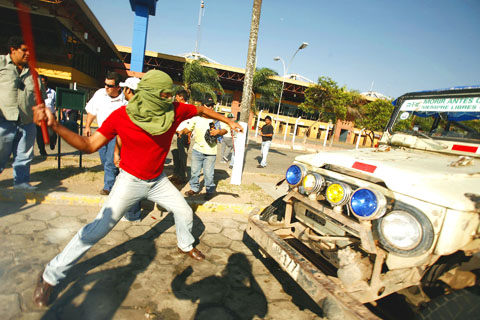Bolivian President Evo Morales said on Wednesday that he would expel the US ambassador for allegedly inciting violent opposition protests.
Morales’ announcement came hours after his government said a pipeline blast triggered by saboteurs forced the country to cut natural gas exports to Brazil by 10 percent.
“Without fear of the empire, I declare the US ambassador persona non grata,” Morales said in a speech at the presidential palace.

PHOTO: AP
He said he asked his foreign minister to send a diplomatic note to US Ambassador Philip Goldberg telling him to go home.
“We don’t want separatists, divisionists,” Morales said.
In Washington, US State Department spokesman Gordon Duguid called the accusation “baseless” and said the US government had not yet received a note about the ambassador.
The US embassy in Bolivia said on its Web site that Goldberg learned of Morales’ action during a meeting with Bolivia’s foreign minister. The statement said he was surprised at Morales’ “sudden decision” and was waiting for official diplomatic notification.
Morales’ close ally, Venezuelan President Hugo Chavez, who also calls the US “the empire,” cheered the move, calling a two-week wave of increasingly violent anti-Morales protests the harvest of an alliance between Bolivia’s “extreme right” and the US government.
The Bolivian leader did not offer specific evidence against Goldberg, but he has long accused the diplomat of conspiring with Bolivia’s conservative opposition. A share of US aid to Bolivia goes to eastern provincial governments that are the nexus of opposition to Morales, which has angered the Bolivian president and his supporters.
Morales, meanwhile, praised protesters who marched on the US embassy in May and has accused Washington of plotting to overthrow him.
In June, Bolivia terminated USAID programs in the coca-growing Chapare region aimed at weaning farmers off the crop from which cocaine is produced. Farmers there had faulted the programs as heavy-handed and ineffectual.
Goldberg met last week with Ruben Costas, one of Morales’ most virulent opponents. Costas is governor of Santa Cruz, Bolivia’s richest province and the seat of a pro-autonomy revolt against the nation’s first indigenous president.
Anti-Morales protests reached a crescendo on Tuesday with the sacking and burning of government offices in Santa Cruz, in which at least 10 people were reported injured.
Anti-government activists also seized several natural gas installations in the east.
At one, in the eastern province of Tarija, demonstrators triggered Wednesday’s pipeline blast by closing a valve, creating pressure that ruptured the line near the border with Paraguay and set off a fire, the government said.
No injuries were reported in what state energy company president Santos Ramirez called “a terrorist attack.”
The government immediately ordered additional troops to secure gas and oil installations.
Ramirez said both gas plants remained occupied by protesters on Wednesday afternoon.
The pipeline blast reduced by 3 million cubic meters the 30 million cubic meters of gas Bolivia sends to Brazil each day, he said. But in Brazil, officials said the gas flow remained normal.
Brazilian Ambassador Frederico Araujo was quoted by the government’s official news service as saying Brazil would not be affected for 48 hours.
“They damaged only one valve, they didn’t explode the pipeline like it’s been said in the news,” Agencia Brasil quoted him as saying.

Four people jailed in the landmark Hong Kong national security trial of "47 democrats" accused of conspiracy to commit subversion were freed today after more than four years behind bars, the second group to be released in a month. Among those freed was long-time political and LGBTQ activist Jimmy Sham (岑子杰), who also led one of Hong Kong’s largest pro-democracy groups, the Civil Human Rights Front, which disbanded in 2021. "Let me spend some time with my family," Sham said after arriving at his home in the Kowloon district of Jordan. "I don’t know how to plan ahead because, to me, it feels

Polish presidential candidates offered different visions of Poland and its relations with Ukraine in a televised debate ahead of next week’s run-off, which remains on a knife-edge. During a head-to-head debate lasting two hours, centrist Warsaw Mayor Rafal Trzaskowski, from Polish Prime Minister Donald Tusk’s governing pro-European coalition, faced the Eurosceptic historian Karol Nawrocki, backed by the right-wing populist Law and Justice party (PiS). The two candidates, who qualified for the second round after coming in the top two places in the first vote on Sunday last week, clashed over Poland’s relations with Ukraine, EU policy and the track records of their

‘A THREAT’: Guyanese President Irfan Ali called on Venezuela to follow international court rulings over the region, whose border Guyana says was ratified back in 1899 Misael Zapara said he would vote in Venezuela’s first elections yesterday for the territory of Essequibo, despite living more than 100km away from the oil-rich Guyana-administered region. Both countries lay claim to Essequibo, which makes up two-thirds of Guyana’s territory and is home to 125,000 of its 800,000 citizens. Guyana has administered the region for decades. The centuries-old dispute has intensified since ExxonMobil discovered massive offshore oil deposits a decade ago, giving Guyana the largest crude oil reserves per capita in the world. Venezuela would elect a governor, eight National Assembly deputies and regional councilors in a newly created constituency for the 160,000

North Korea has detained another official over last week’s failed launch of a warship, which damaged the naval destroyer, state media reported yesterday. Pyongyang announced “a serious accident” at Wednesday last week’s launch ceremony, which crushed sections of the bottom of the new destroyer. North Korean leader Kim Jong-un called the mishap a “criminal act caused by absolute carelessness.” Ri Hyong-son, vice department director of the Munitions Industry Department of the Party Central Committee, was summoned and detained on Sunday, the Korean Central News Agency (KCNA) reported. He was “greatly responsible for the occurrence of the serious accident,” it said. Ri is the fourth person